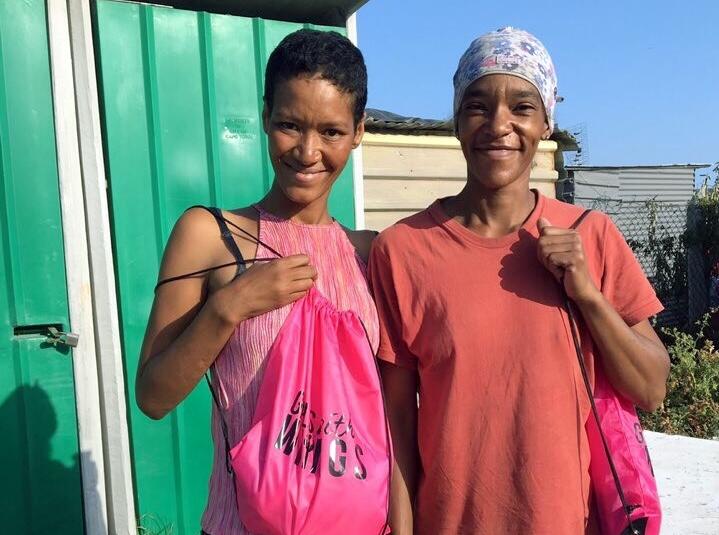CAPE TOWN, South Africa—Imagine, on a day when you had your period, if you had to choose between buying food or pads. What would your priority be? This difficult decision is a reality for homeless women each and every month.
The routine tasks of managing personal hygiene and basic needs present them with a tough choice.
An organization based in Cape Town is tackling this dilemma by providing homeless and underprivileged girls and women with menstrual products. Since 2016, Girls with Wiings has been assisting 250 girls and women in 11 locations with sanitary products every month.
Our most powerful tool when it comes to menstrual health management is action.

menstrual health products that she distributes to homeless and
underprivileged girls and women. © Koinonia Baloyi
“Our most powerful tool when it comes to menstrual health management is action. It’s the power of getting involved, speaking up and taking action,” says Koinonia Baloyi, 28, founder of Girls With Wiings.
Using fitness as a platform to raise resources
True to her words, in 2017 she completed the London Marathon and raised R21,000 (about $1500) for her organization. She uses fitness and well-being as one of her platforms to mobilize funds to provide menstrual health products to girls and women.
“We are giving women a safer and more hygienic alternative to using cloth material and napkins, as well as restoring their dignity," she says.
We are giving women a safer and more hygienic alternative to using cloth material and napkins, as well as restoring their dignity.
Ms. Baloyi initiated the Fitness for a Cause Campaign, which hosted a public outdoor fitness camp in Cape Town in 2018. She was motivated to do so by commitments made at the first East and Southern African Regional Symposium on Menstrual Health Management, which was organized by UNFPA East and Southern Africa Regional Office and the Department of Women in the Presidency of the Republic of South Africa, in Johannesburg, South Africa, in 2018.

funds for their ongoing menstrual health drive, raised R50,000 (about
$3650). © Koinonia Baloyi
The #Fit4Wings event, which was conducted by local celebrity fitness instructors, saw Girls With Wings raise R50,000 (about $3650). The money purchased 1000 bags containing reusable sanitary pads, soap, a face cloth and underwear.
“This campaign has contributed significantly towards the advocacy of menstrual health management,” says Ms. Baloyi. “We have seen an increase in both awareness and participation in menstrual heath issues by large corporates, as well as men, through active partnerships, sponsorships and participation in these events.’’
Inspiring continuous action
With their aspirational name, Girls With Wiings is about inspiring continuous action and not allowing homeless and underprivileged girls, women and other people who menstruate to be alienated from society because of their inability to manage their menstrual health.
Menstrual health management is something we need to keep talking about until it is a normal part of our everyday conversation.
“Menstrual health management is something we need to keep talking about until it is a normal part of our everyday conversation, until it is something we don’t shy away from,” she says.
Ms. Baloyi is one of 400 practitioners who have joined the African Coalition for Menstrual Health, the aim of which is to strengthen the voices of its members. She believes her involvement will amplify the voices of practitioners and activists who have come together to address the menstrual health challenges of those who are so often left behind – including girls, women and other people who menstruate, the homeless, and those in prison or fleeing a humanitarian crisis.
- Cleopatra Okumu


